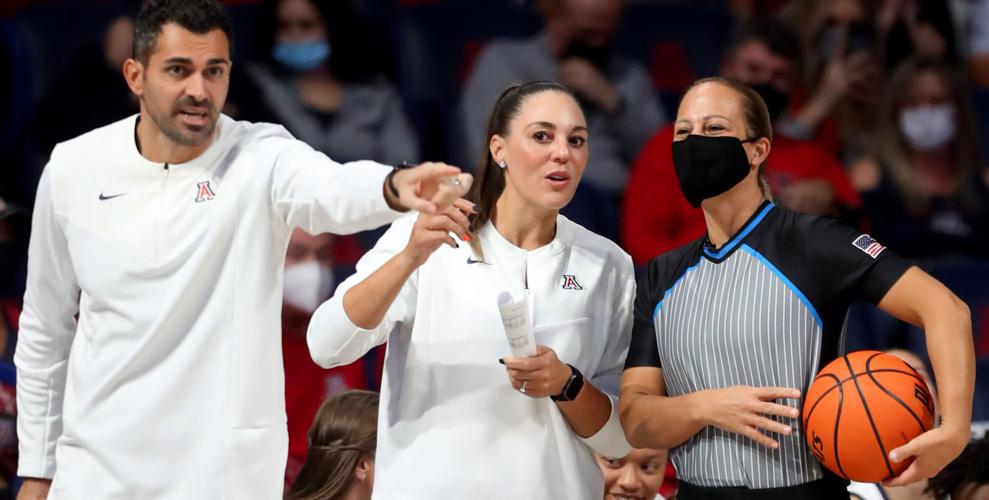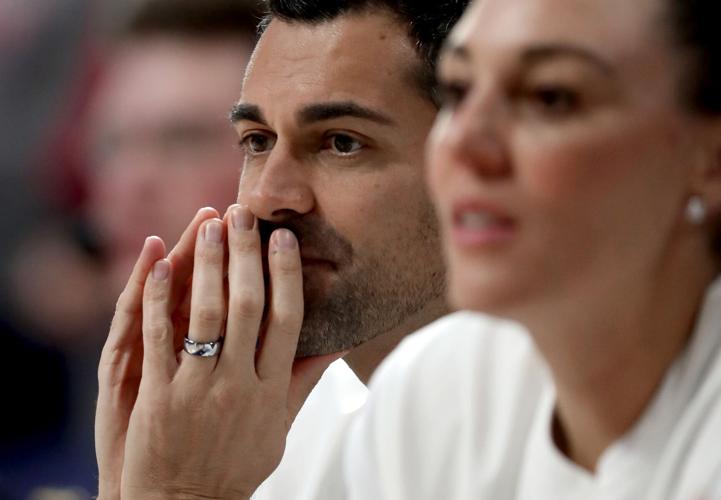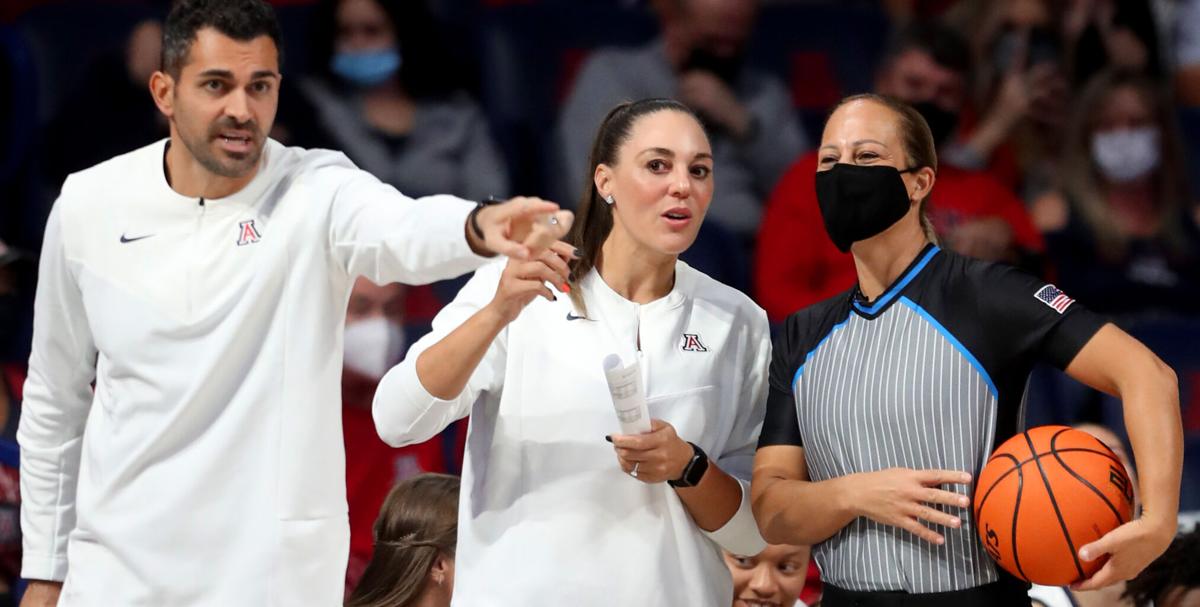Adia Barnes’ travel log for 2021 could make an entertaining 2020s version of Chevy Chase’s old “Vacation” movies. It wasn’t so much “where did she go” as it was, “where didn’t she go?”
Barnes, her husband and assistant coach Salvo Coppa, 6-year-old son Matteo, 15-month-old daughter Capri and a nanny (or two) made business trips to the U.S. Virgin Islands, Puerto Rico, South Dakota, South Carolina, Las Vegas (twice), San Antonio (for 15 days), Washington, Oregon, Utah, Colorado (twice), Los Angeles and San Francisco.
“Our vacation was four days in August,” Barnes said with a laugh. “Four days on Mission Beach near the Ocean Front Walk. It was so noisy we almost couldn’t get any sleep. It was like we needed a vacation after our vacation.”
As business trips go, Barnes and Coppa made such good use of their time that they not only became Tucson’s No. 1 sports couple, you could say they were America’s No. 1 sports couple of 2021.
Together, the two coached Arizona to the championship game of the women’s Final Four. Together, they assembled the nation’s No. 8-ranked recruiting class for 2022. Together, they have coached Arizona to a 10-0 start to the 2021-22 season and the nation’s No. 4 ranking.
Together, Barnes, Coppa and their young family have survived COVID-19 issues, resumed practices at McKale Center and hope to begin Pac-12 competition this week with what Barnes says is a team that “can be better than we were last year.”
Barnes and Coppa share the No. 1 spot on our annual list of Tucson’s Top 100 Sports Figures, the first time there have been co-No.1’s since we started these lists in 1995.
One night late last week — let’s say 10:30 p.m. — Barnes and Coppa were still working. “I get a lot of work done from 10 to about 1 a.m.,” Barnes said “Salvo goes to bed earlier than I do, but he’s usually up at 6, at work while I’m sleeping. This last year has been so crazy; sometimes it seems like I’m exhausted.”
Here’s how you can get the feeling of exhaustion:
Barnes and her family spent 20 days in San Antonio inside the NCAA women’s basketball tournament “bubble,” winning five games, including upsets of Texas A&M, Indiana and the mighty UConn Huskies to reach the national title game against Stanford.
Arizona lost 54-53 only after a last-second shot by All-American point guard Aari McDonald bounced off the rim.
“I watched the replay at least 10 times that night,” Barnes remembers. “It eats at me, not because we called the wrong play or Aari missed the shot, but because we lost that game earlier — on a missed box-out here, a missed foul shot there. The difference between good and great is so small.”
The difference between good and great is also seen in the willingness to continue to work when others kick back and call it a year.
Barnes didn’t do that.
Once the Wildcats returned to Tucson and received a hero’s welcome by thousands of the growing legion of women’s basketball fans at Arizona Stadium, Barnes accepted a role as assistant coach on USA Basketball’s FIBA team in the AmeriCup. After a week at home, kick-starting recruiting efforts, Barnes flew to the U.S. Olympic headquarters in Colorado Springs for a week of tryouts and team selection.
A few weeks later she flew to South Carolina to join USA head coach Dawn Staley for nine days of scouting, evaluation and preparations for June’s FIBA Women’s AmeriCup Tournament. It led to a gold medal a month later in Puerto Rico.

Arizona assistant coach Salvo Coppa and his wife, UA head coach Adia Barnes, have two children together.
While she was gone, Coppa took charge of day-to-day operations at McKale Center, which included offseason workouts, recruiting, babysitting and being a long-distance husband.
In five seasons at Arizona, Coppa has earned a place aside the most valued assistant coaches in UA history. He has become a Jim Rosborough, a Duane Akina, a Jerry Stitt, a Rick DeMont, the Big Four of assistant coaches at Arizona the last 25 years.
Barnes and Coppa are one of two husband-wife coaching teams in the current Top 25, joining Tennessee’s Kellie and John Harper. But Coppa’s qualifications are at a level almost no assistant coach in women’s college basketball can match.
“He was a head coach for 10 years in Europe and Asia,” Banres said. “He has coached teams to gold medals in Malta and Thailand. He was making good money and could’ve been a head coach in the European Pro League. He really gives us an advantage.”
McDonald, now playing for the WNBA Atlanta Dream said: “Salvo cares about you and your well-being. He knows his basketball stuff. He’s a defensive guru.”
Coppa was coaching in the Italian League in 2011 when he noticed Barnes, then a standout forward for Pollacanestra Pozzuoli, walking in a corridor before tipoff. For whatever reason, he reached out and gave the opposing player a high-five. They had never met.
“Somehow, I got her phone number,” Coppa remembers. “I called her twice and she didn’t answer. I waited 10 days and called again. I told myself, this is the last time I’ll call if she doesn’t answer.”
She answered. They went to dinner after the EuroCup. A year later, Coppa moved to Seattle where Barnes was a radio analyst for the WNBA Seattle Storm, soon to be an assistant coach for the Washington Huskies.
“To be with Adia, I’d rather start again from zero,” Coppa said. They were soon married in Seattle.
Ultimately, through a connection to Montana State women’s basketball coach Tricia Binford, Barnes helped to get Coppa his first job in American women’s college basketball, at MSU. The young married couple lived 700 miles apart for almost a year.
Coppa referred to it as “a year of adversity.” That adversity has since changed to success.
Now, living near the UA campus, blessed by a five-year contract that pays a total of close to $1.4 million a year, Barnes and Coppa are about to enter the prime of their coaching careers. She is 44. He is 42.
“We work well together,” Barnes said. “In a lot of ways, this is just the beginning.”






